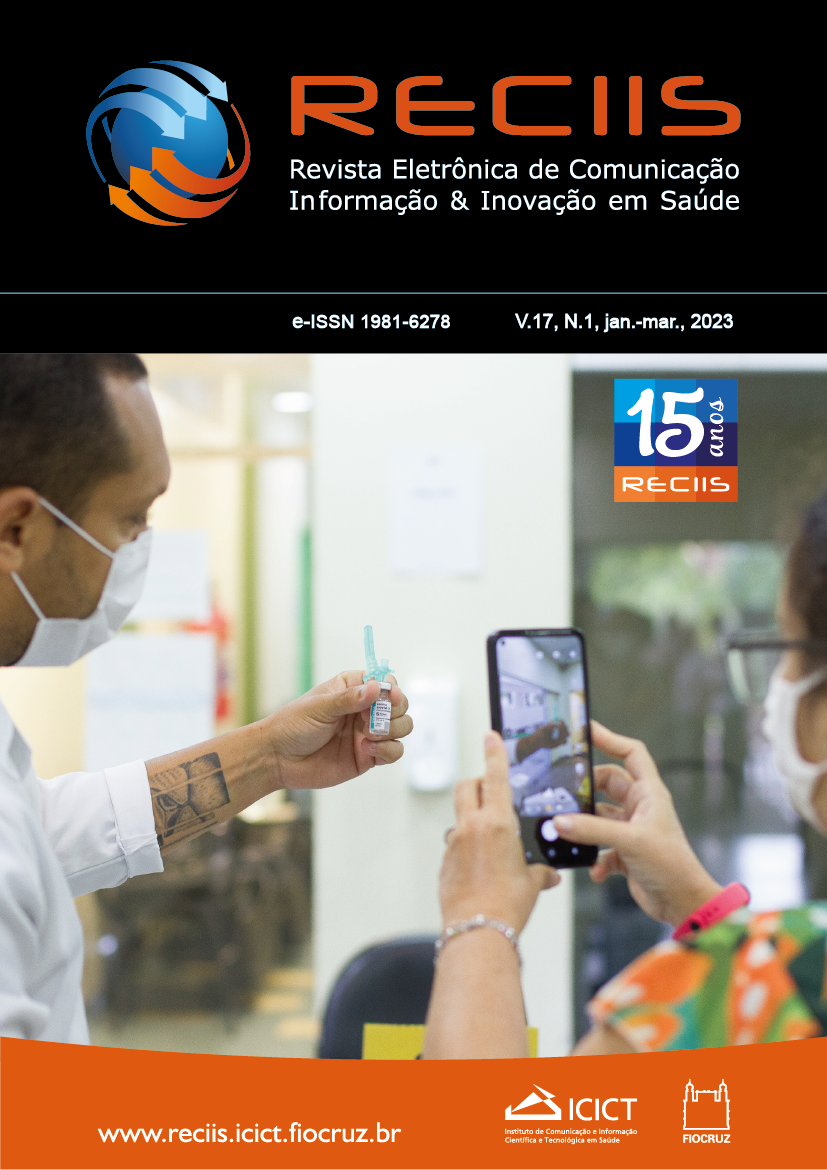Relevance of the information sources in the Brazilian scenario during the covid-19 pandemic
DOI:
https://doi.org/10.29397/reciis.v17i1.3451Keywords:
Information sources, Relevance, Social networks, Covid-19, Information searchAbstract
This paper presents the results of a study on the users’ perception of information of the relevance of information sources used by them to elucidate about covid-19 in the Brazilian scenario during the pandemic of this disease. The data were collected with use of a questionnaire distributed by email, Facebook, Instagram and WhatsApp. The results demonstrated a predominant attribution of relevance to formal and institutional information sources, such as the World Health Organization (WHO), scientific papers, universities, the Anvisa – Agência Nacional de Vigilância Sanitária (the National Health Surveillance Agency), hospitals, and health centers. Among the sources considered less relevant were highlighted newspapers and/or magazines, the Brazilian Ministry of Health, and television channels. Social networks (Facebook, Instagram, YouTube, WhatsApp, Twitter, etc.), friends and/or colleagues, Internet search engines (Google, Yahoo, Bing, etc.) and family members also stand out as less relevant sources of information.
References
ALTMAN, Douglas G. et al. (ed). Statistics with confidence. 2 ed. BMJ Books, 2000.
BAZÁN, Paulo Rodrigues et al. Covid-19 information exposure in digital media and implications for employees in the health care sector: findings from an online survey. Einstein (São Paulo), São Paulo, v.18, p. eAO6127, 2020. http://dx.doi.org/10.31744/einstein_journal/2020AO6127. Disponível em: https://www.scielo.br/j/eins/a/8p3ynzmMCgLyWVWSX3KFLck/?format=pdf&lang=en. Acesso em: 07 fev. 2021.
CARTER, M. P. A methodology for the economic appraisal of management information. International Journal of Informational Management, [s. l.], v. 6, n. 4, p. 193-201, 1986. DOI: https://doi.org/10.1016/0268-4012(86)90021-6. Disponível em: https://www.sciencedirect.com/science/article/pii/0268401286900216. Acesso em: 23 jan. 2023.
CASERO-RIPOLLÉS, Andreu. Impact of covid-19 on the media system: communicative and democratic consequences of news consumption during the outbreak. El profesional de la información, Léon, v. 29, n. 2, e290223, 2020. DOI: https://doi.org/10.3145/epi.2020.mar.23. Disponível em: https://revista.profesionaldelainformacion.com/index.php/EPI/article/view/epi.2020.mar.23. Acesso em: 09 jun. 2020.
CASERO-RIPOLLÉS, Andreu. Research on political information and social media: Key points and challenges for the future. El profesional de la información, Léon, v. 27, n. 5, p. 964-974, 2018. DOI: https://doi.org/10.3145/epi.2018.sep.01. Disponível em: https://revista.profesionaldelainformacion.com/index.php/EPI/article/view/epi.2018.sep.01. Acesso em: 15 jun. 2020.
CENTRO LATINO-AMERICANO E DO CARIBE DE INFORMAÇÃO EM CIÊNCIAS DA SAÚDE (BIREME). Guia da BVS 2005. São Paulo: Bireme, 2005. Disponível em: http://red.bvsalud.org/modelo-bvs/wp-content/uploads/sites/3/2016/05/Guia-da-BVS-de-2005.pdf. Acesso em: 10 jul. 2020.
CHOO, Chun Wei. A organização do conhecimento: como as organizações usam a informação para criar significado, construir conhecimento e tomar decisões. São Paulo: Senac, 2006.
CHONG, Yuen Yu et al. Covid-19 pandemic, infodemic and the role of eHealth literacy. International Journal of Nursing Studies, Oxford, v. 108, p. 1-2, 2020. DOI: https://doi.org/10.1016%2Fj.ijnurstu.2020.103644. Disponível em: https://www.ncbi.nlm.nih.gov/pmc/articles/PMC7255119/. Acesso em: 03 jul. 2020.
JARDINE, Cynthia G. et al. The more the better? A comparison of the information sources used by the public during two infectious disease outbreaks. PLOS ONE, São Francisco, v. 10, n. 10, p. e0140028, 2015. Disponível em: https://journals.plos.org/plosone/article/file?type=printable&id=10.1371/journal.pone.0140028. Acesso em: 25 maio 2020.
JOHNSON, J. David. The seven deadly tensions of health-related human information behavior. Informing Science: the International Journal of an Emerging Transdiscipline, [s. l.], v. 18, p. 225-234, 2015. DOI: https://doi.org/10.28945/2294. Disponível em: http://www.inform.nu/Articles/Vol18/ISJv18p225-234Johnson1715.pdf. Acesso em: 07 jul. 2020.
MARCHAND, Donald A.; KETTINGER, William J.; ROLLINS, John D. Information orientation: the link to business performance. Nova York: Oxford University Press, 2001.
NAZIONE, Samantha; PERRAUT, Evan; PACE, Kristin. Impact of information exposure on perceived risk, efficacy, and preventative behaviors at the beginning of the covid-19 pandemic in the United States. Health Communication, Londres, v. 36, n.1, p. 23-31, 2021. Disponível em: https://www.tandfonline.com/doi/full/10.1080/10410236.2020.1847446. Acesso em: 23 jan. 2023.
OLIVEIRA, Ely Francina T. de; FERREIRA, Karen Eloise. Fontes de informação online em arquivologia: uma avaliação métrica. Biblios, Rio Grande, v. 23, n. 2, p. 69-76, 2009. Disponível em: https://periodicos.furg.br/biblos/article/view/1302. Acesso em: 23 jan. 2023.
REPO, Aatto J. The value of information: approaches in economics, accounting, and management science. Journal of the American Society for Information Sciences, [Leesburg], v. 40, n. 2, p. 68-85, 1989. DOI: https://doi.org/10.1002/(SICI)1097-4571(198903)40:2%3C68::AID-ASI2%3E3.0.CO;2-J. Disponível em: https://asistdl.onlinelibrary.wiley.com/doi/10.1002/%28SICI%291097-4571%28198903%2940%3A2%3C68%3A%3AAID-ASI2%3E3.0.CO%3B2-J. Acesso em: 23 jan. 2023.
RODRIGUES, Noádia Priscila Araújo et al. Divulgação de informações sobre higiene e mudança de hábitos durante a pandemia da covid-19. Research, Society and Development, Vargem Grande Paulista, v. 10, n.1, p. e30910111739, 2021. DOI: https://doi.org/10.33448/rsd-v10i1.11739. Disponível em: https://rsdjournal.org/index.php/rsd/article/view/11739. Acesso em: 20 mar. 2022.
TORRES-SALINAS, Daniel. Ritmo de crecimiento diario de la producción científica sobre covid-19: análisis en bases de datos y repositorios en acceso abierto. El profesional de la información, Léon, v. 29, n. 2, p. e290215, 2020. DOI: https://doi.org/10.3145/epi.2020.mar.15. Disponível em: https://revista.profesionaldelainformacion.com/index.php/EPI/article/view/epi.2020.mar.15. Acesso em: 09 jun. 2020.
WORLD HEALTH ORGANIZATION. Rolling updates on coronavirus disease (COVID-19). Genebra: WHO, 2020. Disponível em: https://www.who.int/emergencies/diseases/novel-coronavirus-2019/events-as-they-happen. Acesso em: 10 maio 2020.
Published
How to Cite
Issue
Section
License
Copyright (c) 2023 Christine Conceição Gonçalves, Ricardo Rodrigues Barbosa

This work is licensed under a Creative Commons Attribution-NonCommercial 4.0 International License.
Author’s rights: The author retains unrestricted rights over his work.
Rights to reuse: Reciis adopts the Creative Commons License, CC BY-NC non-commercial attribution according to the Policy on Open Access to Knowledge by Oswaldo Cruz Foundation. With this license, access, download, copy, print, share, reuse, and distribution of articles is allowed, provided that it is for non-commercial use and with source citation, granting proper authorship credits and reference to Reciis. In such cases, no permission is required from the authors or editors.
Rights of authors’s deposit / self-archiving: The authors are encouraged to deposit the published version, along with the link of their article in Reciis, in institutional repositories.












